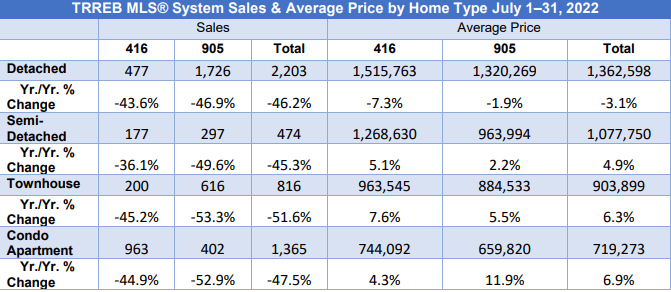
The Greater Toronto Area (GTA) housing market continues to react to the rising interest rates, as July sales came in at nearly half of last year’s levels, and price growth flattening. Time will tell where the market is moving coming out of Summer and into the Fall, however, I feel missing from all the headlines is the seasonality of the market and how extremely robust the market was in 2021 as the base year to compare to.
The Toronto Regional Real Estate Board (TRREB) reported a total of 4,912 homes were sold in the GTA in July, a year-over-year decrease of 47%. That’s also down 24% from June reflecting a difference of just over 1,500 fewer transactions. This is the fourth consecutive month the Toronto and area resale housing market showed declining sales. In March, sales reached 10,881, which was not a record. The record for March sales was achieved in 2021 when an astounding 15,627 homes of all types were reported sold throughout the GTA.
Market conditions remained much more balanced in July 2022 compared to a year earlier. As buyers continued to benefit from more choices, the annual rate of price growth has moderated. The MLS® Home Price Index (HPI) Composite Benchmark was up by 12.9% year-over-year. The average selling price was up by 1.2 % compared to July 2021 to $1,074,754.
The housing market peaked in February for average sale prices when the average sale price for the GTA came in at an incredible $1,334,000. The average sale price has dwindled steadily this year since tighter monetary policy kicked off in March and is now 19% below what is now known as the market’s peak in February. Compared to June, month-over-month home prices are down 6.23%.
“The Greater Toronto Area (GTA) population continues to grow and tight labour market conditions will drive this growth moving forward. Despite more balanced market conditions resulting from rapidly increasing mortgage rates, policymakers must continue to take action to boost housing supply to account for long-term population growth. TRREB has put realistic solutions on the table to address the existing housing affordability challenges. With savings high and the unemployment rate still low, home buyers will eventually account for higher borrowing costs. When they do, we want to have an adequate pipeline of supply in place or market conditions will tighten up again,” said TRREB Chief Market Analyst Jason Mercer.
Looking at the City of Toronto versus the surrounding 905 areas, in the City of Toronto, sales dropped by -43.6% year-over-year, with average prices edging up just 0.32% annually. In the 905 areas, sales activity was down -49%, with average prices up 1.9%.

The eroded affordability appears to be hitting the City of Toronto detached home prices as they are down 7.3%, though still sit at a hefty $1,515,762, with sales down 46.9%. Compared to February, when the average exceeded the $2M price point.
Declines are still significant, though slightly less pronounced in the 905 areas. Detached home prices have dropped 1.9%, to $1,320,269, down by $407,694 from February (-23.5%). Month over month, they’re down 3%.

Less expensive home types, including condo apartments, experienced stronger rates of price growth as more buyers turned to these segments to help mitigate the impact of higher borrowing costs.
In the City of Toronto, the average price of a condo unit increased 4.3% to $744,092. This is trailing semi-detached and townhomes in terms of price growth, but condos saw the strongest sales demand with 963 units sold, more than double that of detached houses.
In the 905 market areas, condo prices saw the biggest gain up 11.9% to $659,820 – but low-rise housing types continued to be the most popular in the suburban areas with 402 condos sold compared to 1,726 detached, 297 semis, and 616 townhouses.
As is seasonally typical for July, fewer sellers are keen to put their homes on the market. New listings declined on a year-over-year basis in July, albeit down by a more moderate 4% and down 26% month-over-month at 12,046. This hardly put a dent in the decline in sales with the sales-to-new-listings ratio moderating further to 59.5% – the edge of a balanced market. The expectation is that the trend for new listings will continue to follow the trend for sales, as we move through the second half of 2022 and into 2023.
The rental market is without a doubt the strongest segment of the market. There are 30% fewer rental listings on the market than last year. The price of one-bedroom units has increased by 20% to an average of $2,270 per month and the vacancy rate for the entire GTA is 0.82%. As rents continue to rise in the strongest rental market ever, it could tempt investors back into the market.
There have been clear signs that home prices are set for a downward trajectory in the Greater Toronto Area, as rising interest rates knock more would-be buyers out of the market.
It is not surprising the market has changed significantly in a short period of time. The housing market in Toronto and throughout North America was on fire with pandemic forces causing people to want more space and safety along with money being historically cheap. It was an unprecedented time. Money is getting more expensive and with society returning to a form of normalcy, the housing landscape compared to February and March and all of 2021 is quickly changing and recalibrating to current economic conditions. The Bank of Canada’s benchmark rate is currently 2.5% compared to March when it was 0.25 percent. In just four months it has increased by 900%. This has led to mortgage interest rates rising from approximately 2% in March to close to 6% today. It is anticipated that when the Bank of Canada meets in September another rate hike is expected with the inflation rate in Canada at about 8%.
The steeper borrowing costs have greatly reduced how much mortgage today’s homebuyers can qualify for, while they simultaneously grapple with a higher cost of living due to soaring inflation.
“Many GTA households intend on purchasing a home in the future, but there is currently uncertainty about where the market is headed. Policymakers could help allay some of this uncertainty. As higher borrowing costs impact housing markets, TRREB maintains that the OSFI mortgage stress test should be reviewed in the current environment. Consumers looking to renew their existing mortgages with a different lender should not be subject to an additional stress test burden beyond what they would face with their existing lender. Given the importance of the housing industry as a driver of economic growth, a transparent process and sound rationale in the development and management of stress test guidelines are also of utmost importance,” said TRREB CEO John DiMichele.
Looking to the fall we should anticipate this cycle of sales decline and average sale prices to continue, however not significant as the declines we have seen since February and March. Our prevailing housing landscape will remain somewhat unchanged until inflation stabilizes and the Bank of Canada stops increasing its benchmark rate.
“With significant increases to lending rates in a short period, there has been a shift in consumer sentiment, not market fundamentals. The federal government has a responsibility to not only maintain confidence in the financial system but to instill confidence in homeowners that they will be able to stay in their homes despite rising mortgage costs. Longer mortgage amortization periods of up to 40 years on renewals and switches should be explored. With the benefit of hindsight, it appears that the Bank of Canada’s rate increases started too late. Now we are dealing with outsized increases to curb generationally high inflation. The federal government must enact measures which will assist buyers facing affordability challenges in an inflationary environment where costs are rising at the gas pumps, the grocery stores, and everywhere in between,” said TRREB President Kevin Crigger.


